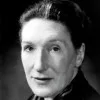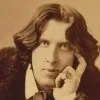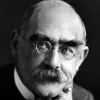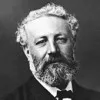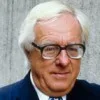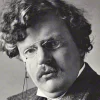The war that Tolkien wrote about was a war for the fate of civilization and the future of humanity, and that’s become the template. I’m not sure that it’s a good template, though. The Tolkien model led generations of fantasy writers to produce these endless series of dark lords and their evil minions who are all very ugly and wear black clothes. But the vast majority of wars throughout history are not like that.
George R. R. Martin (b. 1948) American author and screenwriter [George Raymond Richard Martin]
Interview (2014-04-23) by Mikal Gilmore, “The Rolling Stone Interview,” Rolling Stone
(Source)
Quotations about:
fiction
Note not all quotations have been tagged, so Search may find additional quotes on this topic.
KYLE: It’s all real. Think about it. Haven’t Luke Skywalker and Santa Claus affected your lives more than most real people in this room? I mean, whether Jesus is real or not, he’s had a bigger impact on the world than any of us have. And the same could be said of Bugs Bunny and Superman and Harry Potter. They’ve changed my life, changed the way I act on the Earth. Doesn’t that make them kind of “real”? They might be imaginary, but they’re more important than most of us here. And they’re all gonna be around long after we’re dead. So in a way, those things are more realer than any of us.
Trey Parker (b. 1969) American actor, animator, writer, musician [Randolph Severn "Trey" Parker III]
South Park, 11×12 “Imaginationland Episode III” (2007-10-31) [with Matt Stone, Brian Graden]
(Source)
‘T is strange — but true; for truth is always strange;
Stranger than fiction; if it could be told,
How much would novels gain by the exchange!
How differently the world would men behold!George Gordon, Lord Byron (1788-1824) English poet
Don Juan, Canto 14, st. 101 (1823)
(Source)
Apparent origin of the phrase "Truth is stranger than fiction."
A play is fiction — and fiction is fact distilled into truth.
Edward Albee (1928-2016) American playwright
In Elenore Lester, “Albee: I’m Still in Process,” New York Times (1966-09-18)
(Source)
When asked whether his plays were autobiographical.
Love is more pleasant than marriage for the same reason that novels are more amusing than history.
[L’amour plaît plus que le mariage, par la raison que les romans sont plus amusants que l’histoire.]
Nicolas Chamfort (1741-1794) French writer, epigrammist (b. Nicolas-Sébastien Roch)
Products of Perfected Civilization [Produits de la Civilisation Perfectionée], Part 1 “Maxims and Thoughts [Maximes et Pensées],” ch. 6, ¶ 391 (1795) [tr. Merwin (1969)]
(Source)
(Source (French)). Alternate translations:Love gives greater pleasure than marriage for the same reason that romances are more amusing than history.
[tr. Hutchinson (1902), "The Cynic's Breviary"]Love is a pleasanter thing than marriage, for the same reason that the Romans are more amusing than History.
[tr. Mathers (1926)]Love is more pleasant than marriage for the same reason that novels are more pleasant than history.
[Source]
The person, be it gentleman or lady, who has not pleasure in a good novel must be intolerably stupid.
It was one of those perfect autumn days so common in stories and so rare in the real world.
Patrick Rothfuss (b. 1973) American author
The Name of the Wind, ch. 2 “A Beautiful Day” (2007)
(Source)
“All stories are true,” Skarpi said. “But this one really happened, if that’s what you mean.” He took another slow drink, then smiled again, his bright eyes dancing. “More or less. You have to be a bit of a liar to tell a story the right way. Too much truth confuses the facts. Too much honesty makes you sound insincere.”
Patrick Rothfuss (b. 1973) American author
The Name of the Wind, ch. 26 “Lanre Turned” (2007)
(Source)
So this is the difference between telling a story and being in one, he thought numbly, the fear.
Patrick Rothfuss (b. 1973) American author
The Name of the Wind, ch. 6 “The Price of Remembering (2007)
(Source)
I was stunned to realize that it was possible to make up things that had never happened but which felt as if they’d happened. The church had tried to convince me that there was only truth and falsehood and nothing in between, but the nuns and priests were wrong; the story in front of me was false, but in the reading of it my heart accepted it as true. I turned over the book to reveal the writer’s name. I hadn’t previously paid much attention to the names on book covers, but by god somebody sat down and wrote that story. Wouldn’t it be amazing if I could do that? I thought. And with an electric thrill I felt a key turn deep inside me.
Ruling is hard. This was maybe my answer to Tolkien, whom, as much as I admire him, I do quibble with. Lord of the Rings had a very medieval philosophy: that if the king was a good man, the land would prosper. We look at real history and it’s not that simple. Tolkien can say that Aragorn became king and reigned for a hundred years, and he was wise and good. But Tolkien doesn’t ask the question: What was Aragorn’s tax policy? Did he maintain a standing army? What did he do in times of flood and famine? And what about all these orcs? By the end of the war, Sauron is gone but all of the orcs aren’t gone — they’re in the mountains. Did Aragorn pursue a policy of systematic genocide and kill them? Even the little baby orcs, in their little orc cradles?
George R. R. Martin (b. 1948) American author and screenwriter [George Raymond Richard Martin]
Interview (2014-04-23) by Mikal Gilmore, “The Rolling Stone Interview,” Rolling Stone
(Source)
This is a purely a personal bias but the desire to compel fantasy worlds to conform to the allegedly superior rules of grim reality can feel to me like a form of memetic colonialism I’ve generally found distasteful ….
Grant Morrison (b. 1960) Scottish comic book writer and playwright
“SUPERMAN and THE AUTHORITY annotations Pt 2,” blog entry (16 Feb 2022)
(Source)
The past exudes legend: one can’t make pure clay of time’s mud. There is no life that can be recaptured wholly; as it was. Which is to say that all biography is ultimately fiction.
I have regarded you, not as a novelist, but as an historian; for it is my considered opinion, unshaken at 85, that records of fact are not history. They are only annals, which cannot become historical until the artist-poet-philosopher rescues them from the unintelligible chaos of their actual occurrence and arranges them in works of art.
When people ask me what has happened in my long lifetime I do not refer them to the newspaper files and to the authorities, but to your novels. They object that the people in your books never existed; that their deeds were never done and their sayings never uttered. I assure them that they were, except that Upton Sinclair individualized and expressed them better than they could have done, and arranged their experiences, which as they actually occurred were as unintelligible as pied type, in significant and intelligible order.
As a novelist, I cannot occupy myself with “characters,” or at any rate central ones, who lack panache, in one or another sense, who would be incapable of a major action or a major passion, or who have not a touch of the ambiguity, the ultimate unaccountability, the enlarging mistiness of persons “in history.” History, as more austerely I now know it, is not romantic. But I am.
To return to the matter of the persona, I repeat that one cannot wholly eliminate oneself for a second, and also sufficient, reason: any fiction (and surely poetry too?) is bound to be transposed autobiography. (True, it may be this at so many removes as to defeat recognition.) I can, and indeed if i would not I still must, relate any and every story I have written to something that happened to me in my own life. But here I am speaking of happenings in a broad sense — to behold and react, is where I am concerned a happening; speculations, unaccountable stirs of interest, longings, attractions, apprehensions without knowable cause — these are happenings, also.
The ideal subject of totalitarian rule is not the convinced Nazi or the convinced Communist, but people for whom the distinction between fact and fiction (i.e., the reality of experience) and the distinction between true and false (i.e., the standards of thought) no longer exist.
Hannah Arendt (1906-1975) German-American philosopher, political theorist
The Origins of Totalitarianism, Part 3, ch. 13 “Ideology and Terror” (1951)
(Source)
The good ended happily, and the bad unhappily. That is what Fiction means.
Oscar Wilde (1854-1900) Irish poet, wit, dramatist
The Importance of Being Earnest, act 2 (Miss Prism) [1895]
(Source)
I look at some of the great novelists, and I think the reason they are great is that they’re telling the truth. The fact is they’re using made-up names, made-up people, made-up places, and made-up times, but they’’re telling the truth about the human being — what we are capable of, what makes us lose, laugh, weep, fall down, and gnash our teeth and wring our hands and kill each other and love each other.
Maya Angelou (1928-2014) American poet, memoirist, activist [b. Marguerite Ann Johnson]
“The Art of Fiction,” Paris Review, #116, Interview with George Plimpton (1990)
(Source)
I’m not sure why it happened, and I’m not certain at all when it happened, but at some point, wanting a happy ending became uncool. Maybe it’s the relentless (and again, highly flawed) criticism that “such things aren’t realistic.” To which my response is, so the fuck what? It’s call fiction. If you want real, step outside.
But because we grew up surrounded by big dramatic story arcs in books and movies, we think our lives are supposed to be filled with huge ups and downs! So people pretend there is drama where there is none.
You advise me, too, not to stray far from the ground of experience, as I become weak when I enter the region of fiction; and you say, “real experience is perennially interesting, and to all men.” I feel that this also is true; but, dear Sir, is not the real experience of each individual very limited? And, if a writer dwells upon that solely or principally, is he not in danger of repeating himself, and also of becoming an egotist? Then, too, imagination is a strong, restless faculty, which claims to be heard and exercised: are we to be quite deaf to her cry, and insensate to her struggles? When she shows us bright pictures, are we never to look at them, and try to reproduce them? And when she is eloquent, and speaks rapidly and urgently in our ear, are we not to write to her dictation?
If you would understand your own age, read the works of fiction produced in it. People in disguise speak freely.
Arthur Helps (1813-1875) English writer and bureaucrat
Thoughts in the Cloister and the Cloud(1835)
(Source)
The difference between life and the movies is that a script needs to make sense, and life doesn’t.
In a book, all would have gone according to plan. … but life was so fucking untidy — what could you say for an existence where some of your most crucial conversations of your life took place when you needed to take a shit, or something? An existence where there weren’t even any chapters?
It seems to me that life’s circumstances, being ephemeral, teach us less about durable truths than the fictions based on those truths; and that the best lessons of delicacy and self-respect are to be found in novels where the feelings are so naturally portrayed that you fancy you are witnessing real life as you read.
Truth is stranger than fiction, but it is because Fiction is obliged to stick to possibilities; Truth isn’t.
Mark Twain (1835-1910) American writer [pseud. of Samuel Clemens]
Following the Equator, ch. 15, epigraph, “Pudd’nhead Wilson’s New Calendar” (1897)
(Source)
The so-called lessons of history are for the most part the rationalizations of the victors. History is written by the survivors.
Maxwell "Max" Lerner (1902-1992) American journalist, columnist, educator
It Is Later Than You Think: The Need for a Militant Democracy (1939)
(Source)
The reason that fiction is more interesting than any other form of literature, to those who really like to study people, is that in fiction the author can really tell the truth without humiliating himself.
Science fiction is also a great way to pretend you are writing about the future when in reality you are attacking the recent past and the present.
Considering history as a moral exercise, her lessons would be too unfrequent if confined to real life. Of those recorded by historians few incidents have been attended with such circumstances as to excite in any high degree this sympathetic emotion of virtue. We are therefore wisely framed to be as warmly interested for a fictitious as for a real personage. The spacious field of imagination is thus laid open to our use, and lessons may be formed to illustrate and carry home to the mind every moral rule of life. Thus a lively and lasting sense of filial duty is more effectually impressed on the mind of a son or daughter by reading King Lear, than by all the dry volumes of ethics and divinity that ever were written.
Thomas Jefferson (1743-1826) American political philosopher, polymath, statesman, US President (1801-09)
Letter (1771-08-03) to Robert Skipwith
(Source)
The reason that truth is stranger than fiction is that fiction has to have a rational thread running through it in order to be believable, whereas reality may be totally irrational.
Truth is the most powerful thing in the world, since even fiction itself must be governed by it, and can only please by its resemblance.
Truth, of course, must of necessity be stranger than fiction, for we have made fiction to suit ourselves.
An historian is an unsuccessful novelist.
H. L. Mencken (1880-1956) American writer and journalist [Henry Lewis Mencken]
A Little Book in C Major, ch. 7, § 21 (1916)
(Source)
Variants:HISTORIAN. An unsuccessful novelist.
[A Book of Burlesques, "The Jazz Webster" (1924)]Historian - An unsuccessful novelist.
[Chrestomathy, ch. 30 "Sententiae" (1949)]
The fine arts once divorcing themselves from truth are quite certain to fall mad, if they do not die, and get flown away with by the Devil, which latter is only the second-worst result for us. Truth, fact, is the life of all things; falsity, “fiction” or whatever it may call itself, is certain to be death, and is already insanity, to whatever thing takes up with it.
Thomas Carlyle (1795-1881) Scottish essayist and historian
Essay (1850-08-01), “Jesuitism,” Latter-Day Pamphlets, No. 8
(Source)












